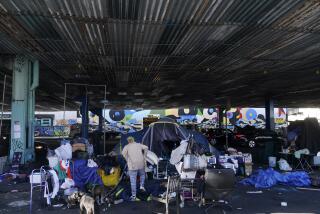U.S. High Court Asked to Upset $144,000 Judgment : Burbank Appeals Amphitheater Decision
- Share via
The City of Burbank has asked the U.S. Supreme Court to reverse a federal appeals court ruling that the city and a former councilman acted improperly in banning rock ‘n’ roll acts at the municipally owned Starlight Amphitheatre in 1979.
Burbank officials contend in a petition filed earlier this month that the appeals court decision “greatly diminished” the rights of cities to program events at facilities they own. The petition asks the high court to reject “the supposed constitutional advances haphazardly dished out” by the appeals court.
The 9th Circuit Court of Appeals ruled last October that the city and former Councilman Jim Richman violated the First Amendment rights of a former operator of the outdoor arena by rejecting seven proposed performances “on the basis of content” and other “arbitrary factors.” Among the performers banned by the council were Jackson Browne, Al Stewart, Patti Smith and Todd Rundgren.
$144,000 in Liabilities
The appeals court affirmed the January, 1983, verdict of a federal court jury that held the city and Richman liable for $20,000 in damages and $119,000 in attorneys’ fees, as well as for a separate award of $5,000 in punitive damages against Richman for his role in banning the performances.
Richman was named as a defendant because of public statements he allegedly made criticizing several of the scheduled performers and their political and social beliefs.
But Burbank city officials charge the Starlight Amphitheatre, which is in a residential hillside neighborhood, is usually vacant and locked and is not a public forum. The city contends in its petition that no one had a First Amendment right of access to the arena and that the city had the right to make it available for “limited civic purposes as it saw fit.”
The city also charges that the appeals court ruling unjustly punishes Richman for exercising his own First Amendment rights by voting as an elected official. The petition contends that the city’s contract with the operators of the arena reserved the right to disapprove the acts and that Richman was “voting his conscious as a city councilman.”
The city contends the federal courts “erred egregiously in holding Richman was not clothed with absolute immunity when he voted,” according to the petition.
All but 2 Rejected
The Burbank City Council, with Richman acting as its most vociferous member, rejected all but two acts proposed by Cinevision Corp. for the amphitheater in 1979. The council members said they feared the rock acts had the “potential for creating a public nuisance.”
Cinevision Corp., which had been contracted by the city to operate the arena, sued the city and Richman, alleging the council banned the acts for no legitimate reason. The promoters charged that the council acted only because it disapproved of the music, the performers’ social views and the possibility that the concerts would attract homosexuals and drug users.
Richman, who served on the council from 1977 to 1981, was a vocal critic of what he called the “commercialization” of the amphitheater and the use of narcotics during events there. He allegedly mentioned Browne’s opposition to nuclear power and the likelihood that Smith would draw a large homosexual audience.
The city’s petition to the Supreme Court, however, states that Richman voted against every Cinevision presentation and did not single out certain acts because of their content or the beliefs of the performers. “Petitioner Richman should not be held liable for merely exercising his own First Amendment rights and voting,” the petition states.
Anthony Liebig, an attorney representing the city and Richman in the case, said Tuesday he believes there is “a reasonably good chance” that the Supreme Court will agree to hear the case.
“If you have a public amphitheater and you would like to provide some nice, wholesome local entertainment, you lose control of that with this decision,” Liebig said. “You would have to open it up to everybody, and many cities just don’t want to do that. Any city councilman in any city in any state in the 9th Circuit has to be concerned about this ruling.”
More to Read
Sign up for Essential California
The most important California stories and recommendations in your inbox every morning.
You may occasionally receive promotional content from the Los Angeles Times.










